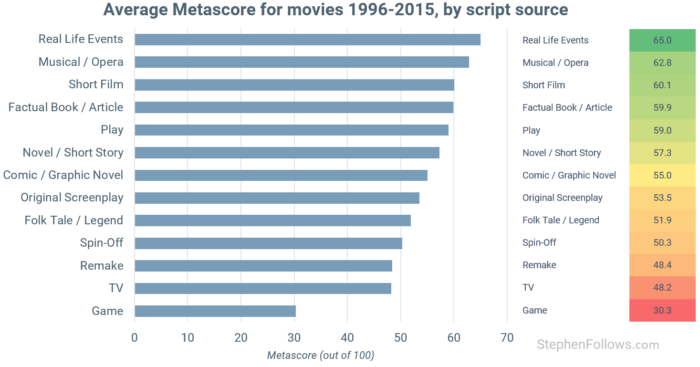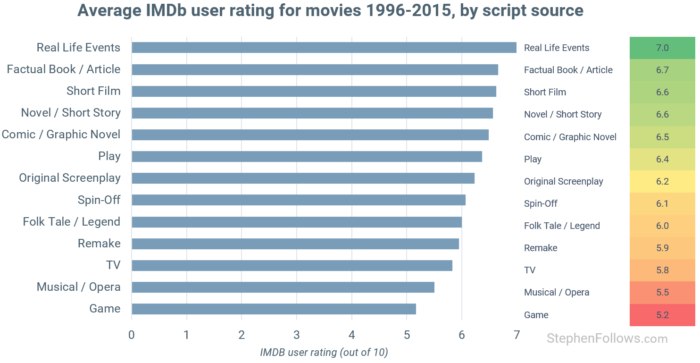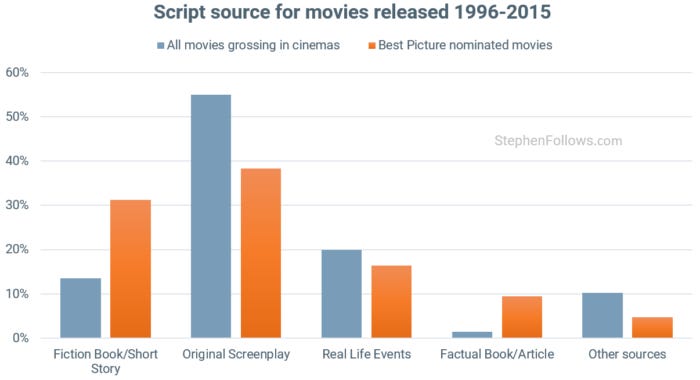Are movies based on true stories better than fictional stories?
Last week, I looked at movies based on true stories, following a question from Kathleen Drumm, TIFF Industry Director. Kathleen also asked about the quality of these movies and posited that they are likely to be better than your average movie, due to the fact that they frequently make up a large number of Oscar nominations for 'Best Picture'.
To study this topic, I built a dataset of all movies which grossed at least $1 in US cinemas between 1996 and 2015 (inclusive) and then looked at each movie's Metascore. Metascore averages the ratings of major film critics to produce a score out of 100. The Metascore will stand in as our measure of what film critics think of a movie and we'll judge the audiences' reaction via the IMDb user rating (out of 10).
Do film critics prefer movies based on true stories?
Movies based on real life events came top with an average of 65.0 out of 100. Movies based on factual books or articles also scored highly with an average Metascore of 59.9, or the equivalent of three stars on a traditional film critics' five-star rating system.
Movies based on video games performed the poorest, scoring just 30.3 out of 100, under half the score of films based on true life.

Film audiences agree
Broadly, film audiences agree with film critics, giving movies based on real life events the highest average rating and giving movies based on video games the lowest.
The biggest difference between the views of critics and audiences was for films based on musicals or operas. Critics rated those films as their second favourite script source (62.8 out of 100), whereas audiences rated them second last (5.5 out of 10).

If you want to read more about the differences and similarities between how film critics and audiences rated movie then you may enjoy my previous research 'Do film critics and film audiences agree?'
The Oscars
Focusing on Kathleen's theory, it turns out that she's right: movies based on real life are more frequently found in the final stages of the race to win a 'Best Picture' Oscar.
In the past few years, movies based on real life events have accounted for most of the winners (including Spotlight, 12 Years a Slave, and Argo) and many of the nominees (including The Fighter, The Social Network, 127 Hours, Moneyball, Argo, Zero Dark Thirty, Dallas Buyers Club, The Wolf of Wall Street, Captain Phillips, American Hustle, 12 Years a Slave, Philomena, Selma , The Imitation Game, American Sniper, The Theory of Everything and The Big Short).

Why is this?
Sadly, the data can't tell us why movies based on real life score so highly. Possible factors include:
Relating to reality. It's a fair assumption that most movies based on real life events are easier for people to relate to than movies based on video games. So it could be that the familiarity leads to a stronger emotional connection between the audience and the characters.
Differing audience demands. Video game audiences are typically younger, therefore statistically they are more likely to be affected by advertising messages and less by the quality of the movie. Conversely, the traditional audience for movies based on real life events is older and more focused on the reviews and word of mouth. This means that movies based on real life have to be good (or as Hollywood calls them, 'execution dependent') if they are to succeed, whereas video game movies are more reliant on famous names and a large marketing spend.
Bias / conventional wisdom. What people say in public is not always what they think deep down. Praising a film based on real life events is often seen as more socially acceptable than doing so about a video game movie. Film critics are particularly susceptible to this bias as their work is designed to be seen by many people, meaning that they are likely to be swayed by how they may be perceived.
Notes
All of the data for today's research relates to feature films which grossed at least $1 at the US theatrical box office. This excludes international movies which did not get a North American theatrical run, straight-to-video movies and made-for-TV movies. The data came from the Opus database, which is a sister to The Numbers website. Unlike last week's research, the classification 'Based on real life events' does not include those derived from factual books or articles.
Some movies don't neatly fit into one category or another. For example, Goodfellas features fictional characters and a fictional plot but is heavily based on the non-fiction book Wiseguy by crime writer Nicholas Pileggi. In today's research, I classed this as 'based on a fictional book'.


